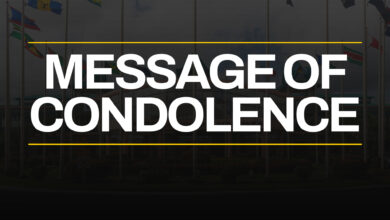Your Excellencies Heads of State and Government of the Caribbean Community, Your Excellency Luiz Ignácio Lula da Silva, President of the Federative Republic of Brazil, Your Excellency Mr. Jules Rattankoemar Ajodhia, Vice-President of Suriname, Your Excellency Mr. Ramdien Sardjoe, Speaker of the National Assembly of Suriname, Your Excellency Rao Inderjit Singh, Minister of State for External Affairs of India, Your Excellency Ministers of the Caribbean Community, Your Excellency Edwin Carrington, Secretary-General of the Caribbean Community, Members of the Council of Ministers, Members of the National Assembly, Distinguished Representatives of the Judiciary, Distinguished Members of State Councils, Members of the National Youth Parliament and CARICOM Youth Ambassadors, Members of the Diplomatic Corps, Members of the Corps of Honorary Consuls, Representatives of International and Regional Organisations and Institutions, Distinguished Representatives of the business community, trade unions and civil society, Distinguished Delegates, Specially invited guests, Members of the Media, Ladies and Gentlemen,
It is with special pleasure that I welcome the Heads of State and Government of the Caribbean Community and their Ministers and other delegates to the 16th Inter-Sessional Meeting of The Conference of Heads of Government of the Caribbean Community. Suriname is highly honored to have you in our midst in the coming days to discuss Caribbean, regional and global affairs.
It is also a distinct pleasure for me to welcome our special guest and friend from our southern neighbor, His Excellency President Luiz Ignácio Lula da Silva, President of the Federative Republic of Brazil.
President Lula, your leadership in Brazil, the region, as well as in global affairs is commendable and we are deeply honored with your presence. We look forward to your views on CARICOM/Brazil relations as well as your views on global and hemispheric developments.
The Caribbean countries have historically been oriented towards Western Europe and North America. It is the highest time that we realise that, besides an eastern and a northern border, the Caribbean also has a southern border, and that beyond that border there is a great potential of markets, technology and culture.
CARICOM's horizon is indeed expanding beyond the traditional political and diplomatic relations, and we are therefore pleased that the Minister of State for External Affairs of India, His Excellency Rao Inderjit Singh, has joined us this morning. Mr. Minister, the friendly relations between Suriname and India are historical and well developed. The Inaugural Joint Commission meeting between CARICOM and India, which was held yesterday, signals an important first step in our journey towards building a strong relationship between our Region and India. We look forward to the development of a fruitful relationship to the benefit of both your country and the Caribbean Community.
Distinguished Leaders and delegates,
The year 2004 did not end well. After the destruction by hurricanes of Grenada, Haiti and other Member States, we witnessed one of the most horrific and tragic catastrophes in the contemporary history of mankind, one beyond comprehension for many.
On the eve of 2005 the earthquake that caused the super tsunami in South Asia, devastating major parts of more than twenty countries in that region, surpassed all existing scenarios in terms of the level of damage, the amount of lives lost and the sorrow it has caused for decades to come.
These catastrophes have demonstrated our limited capability to respond acutely and effectively to the aftermath of these natural disasters.
Closer to home, our sister nation Guyana was recently confronted with weeklong torrential rains, resulting in major flooding in Georgetown and other coastal areas and loss of life.
The situation in Guyana remains critical and requires close monitoring and continued assistance, so as to prevent diseases to develop and present further challenges. A mere 500 miles from Guyana, we in Suriname faced a severe drought in the interior, resulting in food shortages and closure of turbines that produce hydroelectric power.
Distinguished Heads of State and Government, Delegates,
The world has changed dramatically in the past three decades. Since the ending of “cold war” politics, we are now in the midst of searching for a new international political and economic order that can create certainty and security for the Peoples of the world.
Under the influence of globalisation, new initiatives and trends are launched or initiated to establish this new order. But not all of these efforts are beneficial to the needs of many developing economies, especially the small ones.
Poverty and income inequality remain fundamental problems in many countries. The gap between the rich and the poor, the powerful and the powerless, the literate and the illiterate, seems to widen year after year. Almost 250 million persons in the Western Hemisphere alone are living in abject poverty and have no employment or opportunity to earn a daily income.
Trade liberalisation and economic integration should also take into account the social and development agenda. Only then can an environment of stability, peace and prosperity be created. Without this approach, the fundamental political and democratic structures of our societies will be challenged, leading to such expressions as we have seen in many of the countries in our hemisphere: a call for strong governments, whether democratically elected or not, a systematic loss of trust in the political functions of democracies and democratic governance.
We cannot afford this to continue, and measured policy response is necessary.
Over the course of today and tomorrow, we will have the opportunity to discuss some of these challenges and the impact on our Region.
Distinguished Heads of State and Government, Ladies and Gentlemen,
Our agenda also consists of concrete measures in terms of the further strengthening of the integration process.
I take this opportunity to unequivocally confirm Suriname's commitment to the integration process in the Caribbean.
We stand united with you to strengthen our societies and economies by taking and implementing measures that will further this process. Suriname is ready to participate in the Single Market before the end of the year and we will be active in the discussions on the single economy.
It is with satisfaction that I inform you that on 7 January 2005, Suriname issued its first CARICOM Passport, with all the regionally and internationally required features. Indeed, when Surinamese nationals travel through the Region and the world, we will be able to promote CARICOM unity by simply presenting the CARICOM Passport to the immigration officials.
There is more to be satisfied of. Last year we put in place the necessary arrangements to have our Youth Parliament elected. On 12 August 2004, the 29 members of the National Youth Parliament were elected. I had the distinct honor of inaugurating this National Youth Parliament, with representatives from all 10 districts, on 2 November following.
This body is functioning effectively and on 8 January 2005 already they elected the two new CARICOM Youth Ambassadors of Suriname, while meeting in a National Youth Congress on 15 January of this year to debate on key areas of their work program for the coming year. The newly elected CARICOM Youth Ambassadors, who were officially installed yesterday, will be actively promoting among their peers, the purpose and activities of the regional integration movement.
I am indeed very proud that our youth is so actively engaged in issues of governance and regional integration. This bodes well for our future prospects, both nationally and regionally, in terms of political and policy engagement of our new generations.
Distinguished Heads of States and Government, Ladies and Gentlemen,
Since the integration movement started in the 1950's and 60's, and even before that, we have achieved many of the visions and ambitions of the founding fathers of the process. Now it is our responsibility to effectively and strategically respond to the global and regional developmental challenges.
The inclusion of the economies in the global economy should be based on our own characteristics and strengths, utilising all political, diplomatic and negotiating tools available to achieve greater and sustained prosperity for our People.
Transforming our Caribbean societies and economies through a committed and planned modernization process to create an environment characterised by high technology, high skill, high value workers and wages is one of the greatest tasks ahead for the political leaders, for the leaders of the business community and for entrepreneurs.
In the shaping of new hemispheric and global relations between states and regions, we observe an intensified process of integration, most recently in South America, where leaders of the independent countries of the continent announced in December 2004 the objective to establish a Community of South American Nations. These efforts should be seen in the broader context of geographical and political realities, which can facilitate the strengthening of the Caribbean Community, as well as in a significant expansion of economic markets. For our relatively small economies, creating niche markets in an economic space with almost 300 million people, ten times larger than the Caribbean markets, can create new directions for economic prosperity in existing and, if necessary, new industries.
In the next phase of the regional integration process, building strategic alliances with partners worldwide will be critical. It is through these partnerships that our development agenda starting from our own characteristics can be inserted into the global and hemispheric agenda. I am pleased to note the increased interest for cooperation from new partners, like Brazil, in our own hemisphere, and like China, India and the Republic of Korea.
Distinguished Colleagues and delegates,
While speaking about the Region's development and the global challenges facing us, I cannot but share with you some thoughts about a country that symbolises so much for the Caribbean and at the same time has been confronted throughout its history with manifold problems.
To understand and to properly analyze the current crisis in our sister nation and member, the Republic of Haiti, we have to study the history, the suffering and the continued exploitation of the Haitian People since their independence in 1804.
Haiti's problems and challenges are deeply rooted in the history of the country, in the socio-economic structures within the Haitian society and seemingly its politics of conflict and non-compromise.
While the political crisis is continuing, the international community is seeking to support some kind of stability and security and the eight million long-suffering people are continuing their daily struggle and their quest for hope and survival.
We acknowledge the efforts of the President of Brazil, the United Nations, and many other partners in the international community to bring back some level of stability and security in Haiti.
It is time to stop the struggle and suffering of the Haitian people, a responsibility that rests in the first place with the Haitians themselves. At the same time, we have to find ways to agree on short term and long term support for the Haitian people and their democratically elected institutions.
Distinguished Heads of State and Government, Distinguished Ministers, Ladies and Gentlemen,
Before the end of this year we will complete the Caribbean Single Market. This milestone in our CARICOM history marks the realisation of a goal that was set almost 12 years ago. This is, by all means, a major achievement for our Community.
Ladies and Gentlemen, we owe it to the Peoples of the Caribbean Community to continue this process of deepened integration, and soon I hope we will be able to see the Caribbean Court of Justice inaugurated.
Achieving these objectives will indeed require the highest level of political commitment and a strong will to succeed, in solidarity and peace. Only by demonstrating unity and solidarity, can we demonstrate to our peoples and to the world how the small economies of our Community together can make a difference in building a sustainable economy in support of political stability, security, peace and prosperity.
I thank you.





